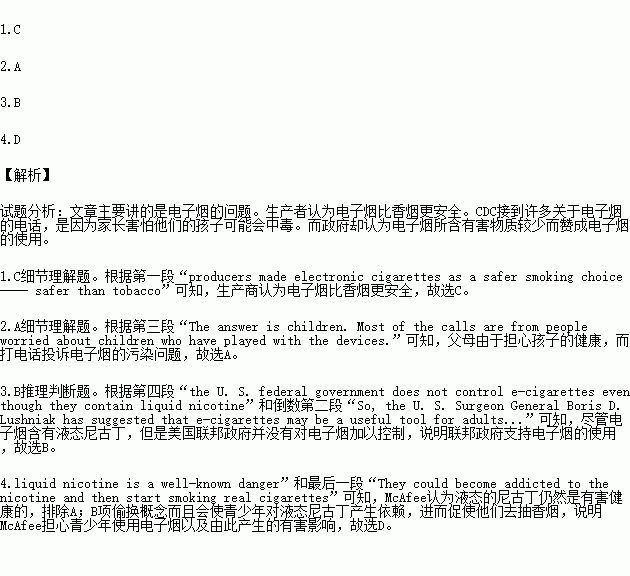题目内容
We know that cigarette smoking kills. So, producers made electronic cigarettes as a safer smoking choice ---- safer than tobacco. Although e-cigarettes contain the drug nicotine like cigarettes, they do not use tobacco and you do not light them. They are powered by battery.
However, if e-cigarettes are so safe, why has the United States Center for Disease Control(CDC)seen an increase in telephone calls about e-cigarette poisonings?
The answer is children. Most of the calls are from people worried about children who have played with the devices. In the period of one month this year, the Center said 215 people called the Center with e-cigarette concerns. More than half of these calls were for children aged five and younger. The devices had made them sick.
Tim McAfee is director of the Center's Office on Smoking and Health. He says the problem is regulation, meaning, the U. S. federal government does not control e-cigarettes even though they contain liquid nicotine. Mr. McAfee adds that liquid nicotine is a well-known danger. Mr. McAfee explains that nicotine poisoning happens when it gets into the skin, gets into the eyes or is swallowed. It can cause stomach pain or a sense of unbalance. And too much nicotine can kill.
Tim McAfee says e-cigarettes do not create the level of risk to people that tobacco products do. He notes that almost 500,000 Americans die each year from cigarettes. "So, cigarettes are the winner in that contest." E-cigarettes do not contain hundreds of harmful chemicals that are found in real cigarettes. So, the U. S. Surgeon General Boris D. Lushniak has suggested that e-cigarettes may be a useful tool for adults trying to end their tobacco use.
But McAfee worries that teenagers may think electronic cigarettes are harmless. They could become addicted to the nicotine and then start smoking real cigarettes. In other words, he fears that for young people fake e-cigarettes could be a "gateway" to the real thing.
1.What do the producers think of e-cigarettes?
A. Dangerous. B. Expensive.
C. Safer. D. Cheaper.
2.Why did the CDC receive so many calls about e-cigarettes?
A. Parents feared that their children might get poisoned.
B. Parents found the device useless in quitting smoking.
C. Children swallowed the liquid nicotine from the device.
D. Children might get addicted to playing with the device.
3.It can be inferred from the passage that .
A. the CDC wants to develop a better type of e-cigarettes
B. the government is in favor of the use of e-cigarettes
C. Surgeon General Boris D. Lushniak is a heavy smoker
D. smokers most probably can't quit smoking using e-cigarettes
4.What is Tim McAfee's opinion about smoking?
A. Adults should use harmless e-cigarettes.
B. Smoking e-cigarettes can make a person sick.
C. He claims that regulations should be made to ban smoking.
D. He is concerned about the teens using e-cigarettes.
 天天向上一本好卷系列答案
天天向上一本好卷系列答案 小学生10分钟应用题系列答案
小学生10分钟应用题系列答案
